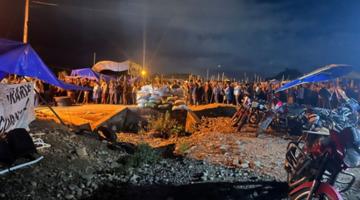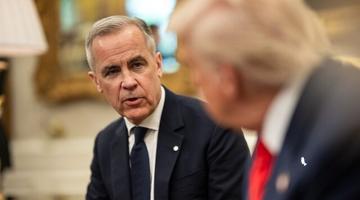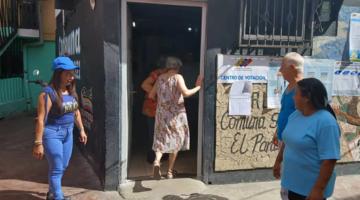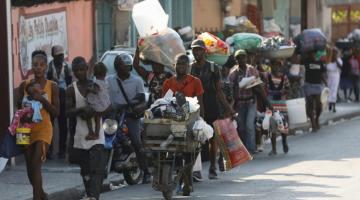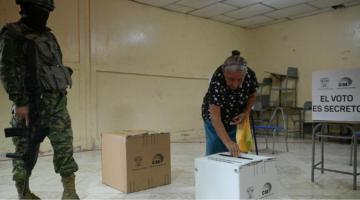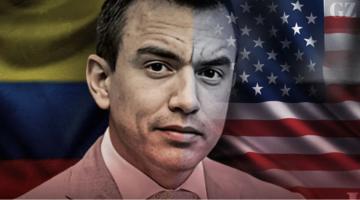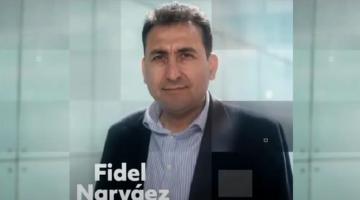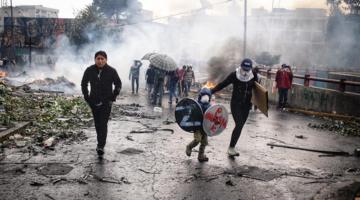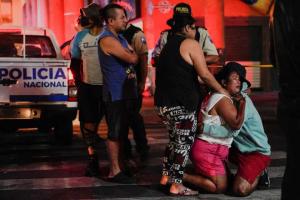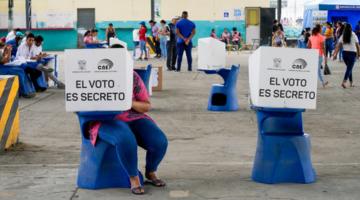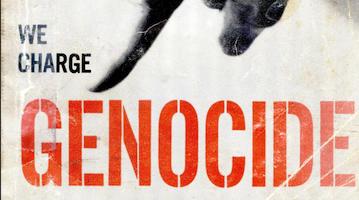Rally outside prosecutors office in Guayaquil demanding the immediate return of the four disappeared children. Photo: CDH Guayaquil.
Defying Ecuador’s attempt to bar international monitors, election observers documented how Daniel Noboa’s contested victory, secured amid militarized polling stations and state violence, escalates the assault on Afro-Ecuadorian communities.
Black Alliance for Peace (BAP), in coordination with the North South Project For People’s Centered Human Rights (NSPPCHR), sent an international election observer team to Guayaquil, Ecuador in solidarity with our local partners, Movimiento Afrodescendiente Nacional Ecuatoriano (MANE), ahead of the national elections that took place on April 13, 2025. The observer team was able to carry out its mission despite the fact that President Daniel Noboa issued a last minute edict, Decree 597, sealing the nation’s northern and southern borders with the intent of denying entry to international election observers.
The National Electoral Council (Consejo Nacional Electoral) declared Daniel Noboa the winner of the second round of elections on the evening of April 13th. It should be noted that Noboa’s main challenger, Luisa Gonzalez, has contested the election results and is demanding an immediate recount. Many are surprised by the election outcomes given the fact that Ms. Gonzalez lost by less than 20,000 votes in the first round of voting and she was able to secure the support of Leonidas Iza, an influential Indigenous leader who secured roughly 500,000 votes during the first round.
That said, with this apparent victory, it is certain that Noboa’s declared “internal armed struggle” will continue to negatively and disproportionately impact Ecuador’s poor and AfroEcuadorian communities. And while the election process ostensibly adhered to international standards, BAP observed several troubling elements, including an excessive military presence, particularly at polling stations located in predominantly AfroEcuadorian precincts. This is precisely why MANE invited an election observation delegation from BAP’s North South Project for People(s)- Centered Human Rights to monitor the situation in those majority African precincts in Guayaquil and share their reports with the world and global African people in particular.
Noboa’s victory is also reflective of the ongoing human rights issues AfroEcuadorians continue to face since the confirmed illegal kidnapping and vicious murder of four AfroEcuadorian youth by Ecuadorian military officials earlier this year. These murders are indicative of the human rights crisis Ecuadorians, and particularly AfroEcuadorians and the poor who make up nearly 30 percent of the nation’s population, are facing due to the current government’s heavy-handed approach to the phony “War on Drugs and Violence.”
BAP’s delegation met with the families of the latest egregious violations to, and systemic dehumanizing of AfroEcuadorians youth who police snipers shot during an apparent raid on a Black community in a Guayaquil barrio. One died from the attack, and another is now permanently disabled, while a third teenager remains hospitalized and permanently paralyzed. All of these victims’ main crimes are that they are Black and poor.
The execrable conditions shouldered by AfroEcuadorians and the poor directly connect to the situation in the region of Esmeraldas, which is more than 70% AfroEcuadorians, that was recently devastated by an oil spill after a pipeline operated by the state-owned petroleum company PetroEcuador ruptured and released approximately 25,000 barrels of oil. Roughly 300,000 of the region’s 500,000 people and the livelihoods of fishermen, farmers, and others are facing dire conditions. The inadequate response to the devastation by the Ecuadorian government, as well as the global environmental community, showcases the environmental racism experienced by AfroEcuadorians in Esmeralda, which is endemic of environmental injustice shouldered by all oppressed Africans whose homelands have been rendered into energy and economic sacrifice zones from Cancer Alley in the U.S. to Port Au Prince in the Revolutionary Republic of Haiti, and the Niger Delta Region. Making matters even worse, BAP’s delegation, during an interview with residents of Esmeralda, learned that the Noboa government sent water to the region in large containers that previously held diesel fuel. This false response to the dire situation further proves the lack of regard and recognition of humanity the Ecuadorian government holds for its AfroEcuadorian population. For these reasons and more, BAP affirms the axiomatic nexus between increasing militarism and an increasing climate crisis that disproportionately impacts Africans and Indigenous peoples the world over.
Noboa’s apparent re-election will only deteriorate the current conditions of Black and poor Ecuadorians.
BAP’s concerns are highlighted by the very real danger of the fulfillment of ongoing efforts to expand the U.S. military’s presence in Ecuador as part of a larger conquest of South America’s Pacific coast. This, in turn, will exacerbate the existing militarized presence in Ecuador, under the guise of security, already subjecting Afro, Indigenous, and poor Ecuadorians to daily human rights violations. The development of an independent, national AfroEcuadorian politics is even more urgent than before to not only counter U.S. and Ecuadorian reactionary right-wing forces but to ensure the human rights of AfroEcuadorians through the power of the people and popular mass movements.
To this end, BAP will continue to support MANE in developing an independent national AfroEcuadorian formation that will be able to identify and defend the fundamental human rights of the AfroEcuadorian people. The last nine months of collaboration between BAP and MANE exemplify this development and commitment to a popular process that will inevitably result in a mass, people-led movement.
No Compromise
No Retreat
This is an ongoing story. There will be more information forthcoming, including, but not limited to, the release of a recent BAP/MANE press conference that took place on April 14, the day after election results were reported.
Ajamu Baraka is the Chairman of the Coordinating Committee of the Black Alliance for Peace and an editor and contributing columnist for the Black Agenda Report. Baraka is the Director of the North-South Project for People(s)-Centered Human RIghts and serves on the Executive Committee of the U.S. Peace Council and leadership body of the U.S.-based United National Anti-War Coalition (UNAC).
Clau O'Brien Moscoso is an organizer and co-coordinator of the Black Alliance for Peace Haiti/Americas Team. Originally from Barrios Altos, Lima, she grew up in Kearny, New Jersey. She attended college, lived, and organized in New York City for 15 years, and is now based in Lima, Perú, writing about Latin America and the Caribbean for the Black Agenda Report.
Anthony Karefa Rogers-Wright is an international climate/environmental liberation and racial justice advocate and practitioner, a writer, and policy expert who resides in the United States with his family and mischievous cat, “Evil” Ernie. He is a proud and active member of the Black Alliance for Peace and Movement for Black Lives. His radio program, “Full Spectrum with Anthony Rogers-Wright” airs on the Mighty WPFW network every Tuesday at 6:00 PM EST.

